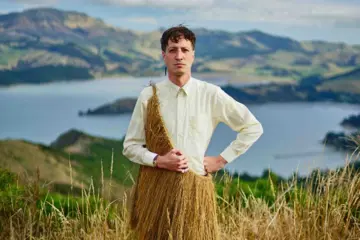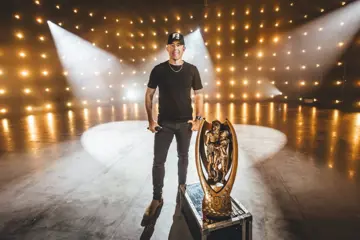Nakkiah Lui is a dab hand at making Australians laugh. Both co-writer and star of hit ABC TV show Black Comedy and hilarious vagina dialogues web series Kiki And Kitty, her race (and class) relations rom-com Black Is The New White returns to the Sydney Theatre Company this month by popular demand following its barnstorming debut season in 2017.
In these febrile days of social media outrage, the high profile afforded to Lui as a result of her success, and her willingness to pop her head above the parapet on issues including Indigenous affairs, means she also cops a lot of online abuse. As she told BuzzFeed News recently, "It makes you so tired and I hate even admitting to that because my career and my work is so important to me. I hate the idea of anyone having power to make me tired," adding, "We think of it as anonymous trolls, but what they say is always being validated by our executive politicians and by people in leadership positions who say outlandish things with no consequences."
As confronting as this blowback can be, Lui's not about to be silenced. "It's just an automatic thing, if you are an Aboriginal person who has a platform, you can't not use it," she tells me while on a break from filming the third series of Black Comedy. "I do feel I have a privilege and I don't want to take that for granted. Social commentary can be a bit tough, because the news cycle these days is so incredibly divisive. But at the end of the day, I am making TV shows and plays and a whole lot of people go into those because they want to engage in someone else's stories. They want to get to know characters, and that does make me feel like it's the salve for prickly news."
Feeling blessed by her dual role as actor and writer, Lui points out she wouldn't be in this business if people weren't interested in listening. "There's that saying that your haters are more loyal than your fans, but I kind of disagree with that, because I think sometimes your haters are just a bit more vocal than your fans. And sometimes they're not even your haters. They just aren't used to hearing your type of opinion."
"We think things like race and gender and class and sex, that these topics are political things. But I don't think that they are. They are humanity things."
Don't miss a beat with our FREE daily newsletter
Forget Christmas in July, barely two months clear of the tinsel fest and the snappy Black Is The New White revisits that day's often-fraught family politics. Directed by Paige Rattray, Black Comedy regular Shari Sebbens plays Charlotte Gibson, a frazzled lawyer who brings her fiance Francis (Tom Stokes) home to meet her upper middle class, lefty parents Ray and Joan (Tony Briggs and Melodie Reynolds-Diarra), both Aboriginal community leaders.
Where things get a little tricky is that Francis is a broke musician, and also white, a fact that takes her parents by surprise. He also brings with him his conservative parents Marie and Dennison (Geoff Morrell and Vanessa Downing). Throw in Lui's best mate and Love Child star Miranda Tapsell as Charlotte's fashion designer sister Rose (with Lui sharing the role on tour) and Anthony Taufa as Rose's former-rugby player and born-again Christian husband, plus a few too many Christmas tipples, and the stage is set for a sharply drawn farce that gets at the heart of this nation's identity crisis with disarming ease.
"I write so much about race, but I try and write it from a very human perspective," Lui says. "I think so often we think things like race and gender and class and sex, that these topics are political things. But I don't think that they are. They are humanity things. They are what people live every day. We can't opt out. It's who we are as people and we kind of just have to deal with it, and we do every single day."
Lui is adamant that Black Is The New White's humour is as much for white folks as it is blackfellas. "What I'm trying to do is erase those lines a bit. It does take that joke to a place where you're like, 'You can't say that, but it's funny,' and I think also in a way we're all thinking it, and that sort of gets politicised by both the left and the right."
Lui chuckles as she recalls that the original read through alerted her to the fact she had some homework to do on getting the moneyed Gibsons right. "I realised I grew up so poor, I'd always thought I'd written the characters as upper middle class, but I guess because I'm from the western suburbs of Sydney and I'm a bit of a bogan Aboriginal, a lot of people didn't really consider them as such, so I had to do a lot of research on being rich, which was a lot of fun."
The play is as much about class expectations as it is about race. "We have a really interesting relationship with class in Australia," Lui notes. "We just pretend we don't have class. We totally do, and I think it's this really weird way for the richest of us to try and pretend that they are the hardest done by, if you look at anything the Rhineharts and the Murdochs, so I was reading a lot about millennials and baby boomers and the idea of inherited wealth and entitlement."
If that sounds heavy, Black Is The New White is anything but, Lui assures. She begins to tease a funny family story where she and her sister got barred from a yum cha restaurant, but stops short of the punchline, for the sake of spoilers: the episode is lifted wholesale for a key joke in her wisecracking play. “You know when you listen to Mariah Carey’s All I Want For Christmas Is You, and everybody has that one song, or that one moment in a film that makes you want to get up and you feel like you have heaps of energy coming out of your bum? That’s what I wanted this play to feel like.”
After all, people pay good money to come see it, she adds. "This might be the western suburbs in me, but theatre is expensive, so if people can have a good night where they get to have a think and it stays with them, or if it feels like a bit of a release from the world that we live in, then that's a gift to be able to do that."
Sydney Theatre Company presents Black Is The New White from 2 Mar at Roslyn Packer Theatre, from 21 Mar at Riverside Theatres Parramatta, and from 28 Mar at Canberra Theatre Centre.















